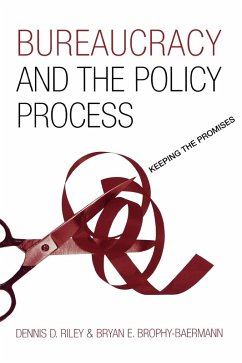The central role that bureaucracy plays in the policy process is played by individuals, namely, by subject matter experts and managers we call political executives. The context in which these executives play their roles is defined by three key forces-the organizational environment of bureaucracy itself; our governing philosophy stressing responsiveness, respect for individual rights, and accountability; and the demands of the people and the institutions those people have created to govern themselves. This book provides an in-depth look at each of these forces, with chapters specifically devoted to how bureaucrats interpret their role in the policy process, how the organizational environment influences their ability to play that role, and most of all, to the interactions between bureaucrats and the institutions of what we call the Constitutional government-the President, the Congress, and the Courts.
Hinweis: Dieser Artikel kann nur an eine deutsche Lieferadresse ausgeliefert werden.
Hinweis: Dieser Artikel kann nur an eine deutsche Lieferadresse ausgeliefert werden.
Bureaucracy and the Policy Process is a stimulating and accessible introductory text on American public administration and policy-making. Political Studies Review The Constitution doesn't mention it, yet the bureaucracy has become the largest 'branch' of government and the most influential in the daily lives of Americans. How did this happen? Why do we have a bureaucracy? Who are the bureaucrats? What do they do and why? These are the questions answered in Bureaucracy and the Policy Process. Dennis Riley and Bryan Brophy-Baermann present an engaging, accessible, and thorough exploration of the bureaucracy, humanizing the people in it, and dissecting the political context surrounding it. -- Sheldon Gen, San Francisco State University








